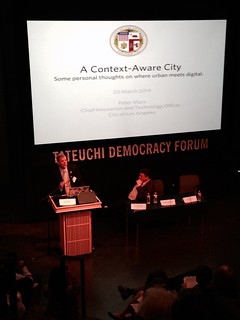 The technologies drawing attention are user-centric that allow both users and providers to interact and share information about the transportation network. Active transportation and Safe Routes to Schools advocates should care about these trends because they are expanding transportation options, promoting active lifestyles and tipping the political scales towards multi-modalism in planning and implementation.The digital space is using the influx of information (i.e. big data) to find patterns and efficiencies in the transportation system. These mobile and web applications are facilitating supportive programs and policies for walking, bicycling and Safe Routes to School, even when active transportation is not the immediate focus of mobile and web applications. Safe Routes to School supporters will be able to better partner with transportation agencies, organizations and advocates, if they stay alert to the culture changes that technology is causing within transportation.
The technologies drawing attention are user-centric that allow both users and providers to interact and share information about the transportation network. Active transportation and Safe Routes to Schools advocates should care about these trends because they are expanding transportation options, promoting active lifestyles and tipping the political scales towards multi-modalism in planning and implementation.The digital space is using the influx of information (i.e. big data) to find patterns and efficiencies in the transportation system. These mobile and web applications are facilitating supportive programs and policies for walking, bicycling and Safe Routes to School, even when active transportation is not the immediate focus of mobile and web applications. Safe Routes to School supporters will be able to better partner with transportation agencies, organizations and advocates, if they stay alert to the culture changes that technology is causing within transportation.
First, I posit that ride and car-sharing services will bolster walkable and bikeable communities. I see many ways that students and families will be supported and encouraged to be car-free or car-limited with more reliable alternative networks, such as ride and car-share, cross jurisdictional bicycle and pedestrian networks and public transportation. Ridesharing mobile applications like Uber, Lyft, and Sidecar are booming and flipped the script on taxi and car services and local job creation. Users of ride share applications can name their price for trips with Lyft and benefit (or suffer) with surge pricing with Uber. Potentially communities benefits in the strengthening of ride and car-share through crowdsourcing affordability and flexibility. Paratransit riders - usually the elderly and persons with disability - are also frequent users of ride-shares. Additionally, car sharing companies like Zipcar allow drivers to rent a car by the hour, where prices include insurance and maintenance. Personally, I know families that would benefit from having better access to alternative networks to get children to school and after-school activities. One family in particular was forced to give up their car free lifestyle when the local Zipcar location was closed. These technologies are means to fill in the transportation gaps for communities and families.
 There were two significant developments this month in Washington D.C for Safe Routes to School. First, the U.S. Department of Transportation (USDOT) released its proposed rule addressing safety on our roads.
There were two significant developments this month in Washington D.C for Safe Routes to School. First, the U.S. Department of Transportation (USDOT) released its proposed rule addressing safety on our roads.

 All of us are working hard to make our neighborhoods safer for kids and families to walk to and from school. But now, we need your help to ensure that the health and safety of our loved ones does not take a back seat to automobile passengers, simply because they chose active transportation over driving.
All of us are working hard to make our neighborhoods safer for kids and families to walk to and from school. But now, we need your help to ensure that the health and safety of our loved ones does not take a back seat to automobile passengers, simply because they chose active transportation over driving.
 The technologies drawing attention are user-centric that allow both users and providers to interact and share information about the transportation network. Active transportation and Safe Routes to Schools advocates should care about these trends because they are expanding transportation options, promoting active lifestyles and tipping the political scales towards multi-modalism in planning and implementation.The digital space is using the influx of information (i.e.
The technologies drawing attention are user-centric that allow both users and providers to interact and share information about the transportation network. Active transportation and Safe Routes to Schools advocates should care about these trends because they are expanding transportation options, promoting active lifestyles and tipping the political scales towards multi-modalism in planning and implementation.The digital space is using the influx of information (i.e.  During the month of February, America paused to celebrate the historical achievements of African-American pioneers all over the nation. In March, the celebration continues, but with a different theme.
During the month of February, America paused to celebrate the historical achievements of African-American pioneers all over the nation. In March, the celebration continues, but with a different theme.